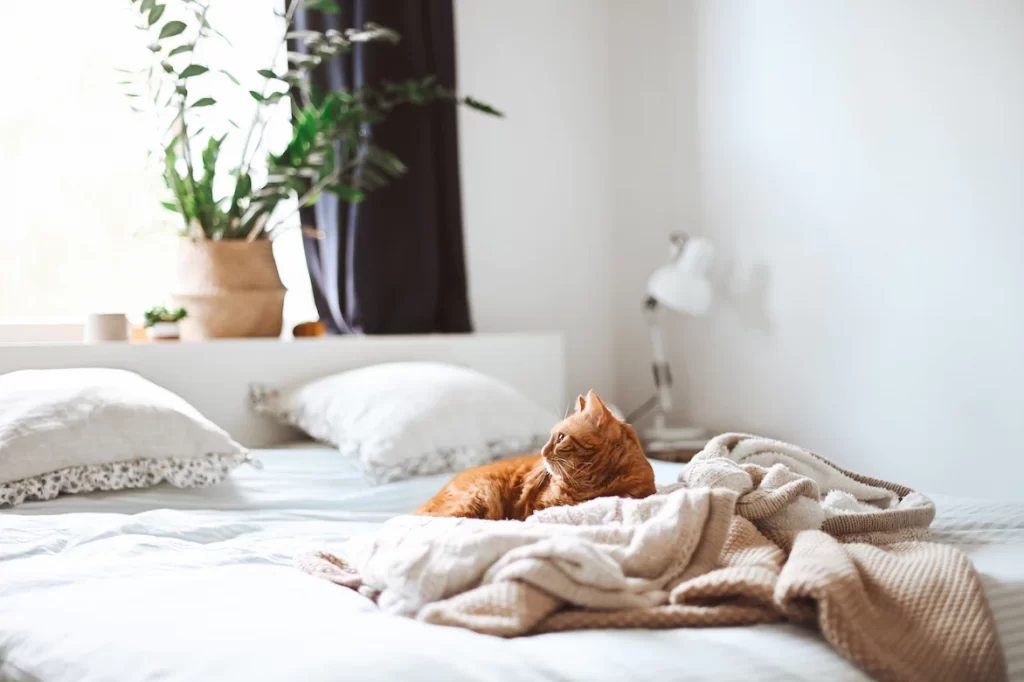Last updated on February 4th, 2023 at 02:26 am

Have you ever woken up to a nauseating smell only to find that your clean white sheets have been a victim of your cat atrocities? Sometimes it’s just mishaps, but if it becomes a common routine, it becomes a problem. Before you give up your cat or reprimand your lovely cat harshly, ask yourself what could be the cause and what you can do to stop your cat from peeing on your bed. Let’s look at the first question, shall we?
Reasons why your cat may pee on your bed
1) Litter box issues
This is one of the main reasons your cat may make your bed in its bathroom out of nowhere. These little felines are very choosy animals in nature. They are known to be picky about what they eat, where they sleep, which toy they will play with, and even whom they will spend time with.
Therefore, if the litter box is not to their liking, they will waste no time finding a new place to do their ‘’business.’’ But why this sudden change of attitude? Here are some reasons why your cat may reject its litter box.
- Privacy
These cute furry pets are usually known for their secretive nature. Have you ever noticed how sometimes you may miss seeing your cat for up to half a day before they appear out of the blue? This is cause cats usually value their privacy. This is even more true when it comes to their “business’’. Therefore, place the litterbox somewhere where it is secluded and private.
- Location
Other than privacy, noise is another key reason your cat detests your litterbox location. You should know that your cat is very sensitive. You are therefore doing neither your cat nor yourself any favors by positioning the litter box in hallways and around noisy house equipment.
Cats are generally very sensitive and instinctively ignore the litter box and seek a quieter location to relieve themselves. What is the quietest and most private part of the room? Bingo, your bedroom on your fluffy bed. Therefore, look for a nice quiet place for your kitty as you prioritize your privacy.
- Uncomfortable
Other than privacy, your cat also values its comfort. One of the things that makes the litter box uncomfortable is its level of cleanliness. If you are lazy and constantly need to remember to empty and clean your cat’s litter box, you leave no choice but for your cat to take its business somewhere else tidier and cleaner, like your bed. Therefore, make a schedule for either you or any helper to not only empty but also to keep the place clean and attractive.
- Fewer litter boxes
We have established that these little felines are private animals. In addition, they are also very territorial, which is why they are not big fans of sharing. This means that if you have more than one cat, you should probably consider getting more than one litter box, if not each cat with its own. This is to avoid any conflicts leading to one of your cats resorting to converting your bed into its restroom.
RELATED: 7 Best Cat Litter Box Enclosures
2) Change in routine and environment
Felis Catus, the scientific name of a cat, is well known to be a habitual creature. They like to be where they are familiar with the environment, the things, and the people around it. Therefore, a big change, such as a house or neighborhood, can affect your cat’s lifestyle, which may affect its potty training.
Moreover, small changes too can lead to such effects. Changes include introducing a new pet, such as a dog or another cat and even an additional family member, like a newborn baby. Therefore, if you are planning a change in your lifestyle and that of your cat, be sure to anticipate this not-so-strange change of behavior, such as it might pee on your bed.
3) Medical issues
This is another main reason which explains the sudden change in the potty behavior of your cat and why it keeps soiling your sheets. Several diseases affect your cat’s urinary bladder system; let us look at some of the most common, shall we? We have urinary tract infections of the kidneys, bladder, or urethra, diabetes mellitus, and idiopathic cystitis, a urinary tract disease that causes abnormal urination in cats. This can contribute to your cat having lost accidents on your bed, especially when it was its casual resting place.
4) Boredom
Cats are very agile and energetic animals, especially when they are still young and growing up. They are more door animals who like hunting and playing with little children or engaging in activities such as bird watching. Therefore, if you lock them inside the house or stop being around suddenly, it causes them to be agitated and usually act out. One of the methods to demonstrate their agitation is peeing on your bed and pretty much anywhere around your house.
5) Anxiety and stress
Yes, you heard me right. Like you and me, cats can get stressed and experience anxiety attacks. This anxiety may be caused by several factors, either internal or external. Internal causes usually include illnesses such as idiopathic cystitis, internal pain, and psychological trauma from abuse and neglect. External causes include physical pain, improper socialization, and being physically separated from their favorite person or object.
Here are some signs and symptoms to help you identify if you are suffering from stress or anxiety. One of the most common symptoms is that your lovely buddy becomes aggressive and restless out of the blue. They start pulling out their hair, meowing louder, biting, and peeing on your sheets.
How do stop my cat from peeing on my bed
1. Solving the litter box issues
Well, no problem does not have a solution. By now, I bet you have a pretty good idea why your cat hates the litter box you set for it and prefers your comfy bed. But what can you do about it?
I think the issue regarding matters of privacy is quite evident in itself, therefore, take the litter box and place it on easily accessible corners but also at the same time offer some level of privacy. Also, spend some time analyzing your cats’ favorite spots to hang out and then strategically place the litterbox nearby.
If you have done this and there are still no changes, then the problem may not be the place but the litter box itself. As you already know, cats are very preferential creatures and, therefore, may not particularly like the shape, size, or even color of the litter box you have chosen. Or they simply need a new litter box, as this one is worn out and may have cracks that lock its claws and scratches its body. To avoid this, go litter box shopping with your cat and let it choose what it likes best.
Sometimes the litter box is just simply uncomfortable. Ensure you always clean it regularly and do not use detergents with strong scents because these furry creatures usually have a strong and sensitive sensory organ of smell. Therefore, use little or no air fresheners and strong detergents to freshen up the litter box.
RELATED: Why Has My Cat Stopped Using The Litter Box?
2. Making necessary changes
If all these tactics are not working, you can shift your focus to your bed. There are two possible options you can explore. The tactic is to associate your bed with only good things that prevent your cat from seeing it as a relieving space. Have you ever heard the expression that does not shit where you eat? Well, in this case, we will apply this principle literally.
Systematically start feeding your cat and leaving cat treats on your bed or where it has been peeing. Do this periodically to create a common pattern; your actions automatically associate your bed with its meals and desist from peeing on it. But notice this is only a temporary solution as you look for the real problem.
The second option is the opposite. Make the bed where the cat usually pees on very uncomfortable and disgusting. Use substances such as mackintosh and non-absorbent materials to make the place wet and uncomfortable. Remember, this is a temporary tactic to stop my cat from peeing on my bed.
3. Taking it to the vet
One of the major causes of this behavior is medical issues the cat may be experiencing. Your cat may be suffering from diseases affecting the urinary tract and bladder, causing it to have a loose bladder. Once you notice this, take your cat to the local vet as soon as possible for diagnosis and treatment. Also, make it a habit to take your cat to the vet for a regular checkup to prevent any further incidents.
Your cat may not suffer from any disease but anxiety and stress. Visit a pet clinic or a vet to get recommended relaxers such as ointments and relaxing creams. One of the most commonly recommended relaxers is the pheromone relaxant. This will help your cat calm down and reduce its overall anxiety.
4. Use of restriction measures
You can also just bar your cat from accessing your bed as you get to the bottom of this quire behavior. One of the ways you can prevent your cat from accessing your bed is by simply ensuring your door is always kept locked to stop my cat from peeing on your bed. Keep every door under lock and key except where the litter box is to train your cat on proper potty manners.
Another simple method is purchasing a cat repellant and spraying it on your bed. Your cat will instinctively keep away from your bed and reverse back to its litter box; get a vet-recommended spray to avoid harming your cat.
5. Getting a behaviorist
If this behavior persists, consider hiring a behaviorist or a trainer. Yes, they do exist, experts in cat behavior. They will help you to get your cat back in line. They will re-train your cat and bring it to stop peeing on your bed in no time.
Conclusion
You have a pretty good idea of why not only your cat pee on your bed but also how to stop my cat from peeing on my bed again. Cats are usually disciplined pets; if they act this way, it’s an indicator that something is off. As we have seen, it may be its character or attitude, medical problems, stress, and litter box issues. We have seen how to tackle these issues at length, and the ball is now on your coat to identify the cause and apply the proper method. The sooner, the better.


